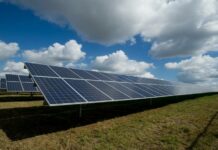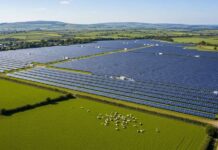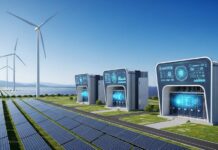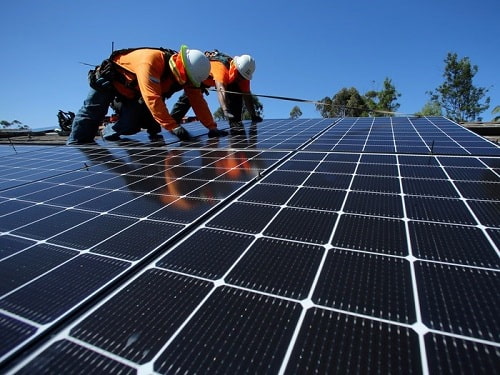Are you considering an alternative source of electricity for your home or office? Solar power could prove very handy in helping you solve that puzzle. Solar energy refers to radiation emitted from the sun with the potential of producing heat or generating electricity.
This form of energy has become prominent given its strengths and durability in different settings. You can check out the NY-Sun program for attractive programs accessible to business and residential homes.
Why is the New York Solar Program Important?
Solar radiation refers to light emitted by the sun. The sun serves as an immense source of energy and sunlight is regarded as the biggest energy source received by earth. Radiation can be captured by solar technologies and turned into a worthwhile energy form. The sum of renewable energy occurrence on earth outweighs the world’s present as well as anticipated energy needs.
In view of its relevance, the government introduced the New York (NY) renewable energy program. The program is intended to make solar energy affordable and easily accessible by every home in New York. It also boasts of tax credits, incentives, education, training and loans aimed at assisting low-income homes own a renewable energy system.
Part of the incentives are net metering, NY Green Bank, NY State Tax credit and megawatt block incentive structure.
Types of Solar Technology
They are divided into categories according to how they function. They are as follows:
Photovoltaics (PV)
This is mainly used in solar panels. This works by absorbing sun that shines on a panel through the PV cells. It results in electricity flowing by creating electrical charges in response to electrical field that occurs in the cell.
Concentrating, Solar-thermal Power (CSP)
CSP utilize mirrors to concentrate emission from the sun onto receivers that gather energy, convert to heat and can be utilized to give electricity or reserved for future use. This option is mainly used in big power plants.
Pros and Cons of Solar Power
Just like many other endeavors, renewable energy has some advantages and disadvantages that come with its use. Below are few of them:
Pros
- This form of energy is free of pollution and does not prompt emission of greenhouse gases after its installed
- It reduces dependence on oil and fuel
- It offers power that is sustainable and available throughout the year, power is even produced during cloudy days
- Offers gains on investment compared to utility bills
- Does not require constant maintenance as panels have a lifespan of about 30 years
- Capacity to lead grid free life if generated electricity is enough for your home
- Can be installed almost anywhere; ranging from field to a building
- Stores extra power on batteries that can be used at night
- It can be utilized to boil water, power business complex, homes and power cars too
- Much safer compared to orthodox electric current
- Its efficiency improves over time such that one of same size can appreciate in usefulness in the future
- They are becoming more versatile and aesthetically appealing given advancement in technology
- Grants, rebate programs and tax incentives can be accessed to cushion initial costs
- Does not require trenching given that the panel might be close to the place of installation
Cons
- It requires huge fund for material, installation while ROI takes long
- Large space is required as efficiency is yet to be at 100%
- Since there is not sunlight at night, it necessitates big battery bank for sustenance
- Some individuals find them quite ugly
- DC Power dependent devices are costlier than others
- Energy is affected by weather conditions as cloudy days witness less energy
- To an extent, cars powered by solar are not as fast as gas-powered automobiles although there are changes in recent times
- Drop in solar production during winter
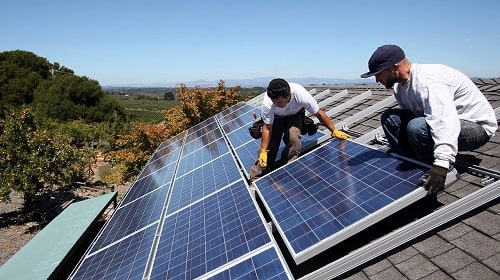
Things To Consider Before Installing Solar Panels
Before deciding to install solar panels, there are a few things that you need to consider. The list below will try to give you as much information as possible to guide your choice. The following should be considered:
Suitability of Your Home
Before choosing renewable energy, you should consider your roof structure, orientation as well as nearby shade. Panels require some space to be effective. However, the space required will depend on the size of your home and the amount of power one is considering to conduct. Ideally, 200 square feet of space should be targeted for optimum performance.
The needed space ought to be clear of obstructions such as pipes, chimneys or skylights. The orientation of a roof is also a key factor to be considered. For example, roofs facing north are exposed to less sunlight when compared to those facing south.
Additionally, if there is shade near your roof it might affect the sunlight that your panel has access to.
Cost of Solar Panels
When considering the cost involved, the size of your home will inform the scope of the project. Basically, the cost implication for a residential building range between $15,000 – $25,000.
One can consider paying in cash, obtaining a loan or lease as a means of payment. It is also important to consider the rebates as well as tax credits payable due to owning a solar system. Varied states and cities provide rebates as well as tax credits to residents.
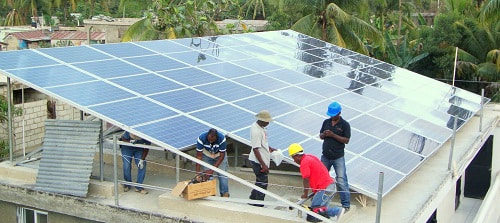
How Conducive is the Weather and Climate Condition?
The prevailing climate/weather condition in New York will greatly impact the electricity generated. This is due to the fact that renewable energy depends so much on sunlight to function. Areas in New York with more sunlight are more ideal compared to ones that experience less sunlight.
Choice of Solar Panels
Solar panels come in different types and the appropriate one for your home should be selected. Some of the types are movable, mounted and shingles panels. Mounted panels rank as the most widely used and popular among many homes; they made with Silicon and they vary in durability and price.
Will A New Roof Be Required?
The suitability of your roof will be checked to ensure it can carry the weight, especially in cases when your roof is due for replacement in no distant time. Also check whether the roof’s warranty will be impacted by fixing panels on them.
Is There Need For Alternative Energy?
You don’t necessarily need an alternative electricity source if you do not want. If you opt for an on-grid system, your apartment will be linked to the city’s power grid to guarantee continuous electricity source if necessary. This is necessary if your home is in an area without consistent sunlight or where it is lacking most months of a year.
However, you might decide to stay off the grid and depend on generators and battery storage. This will need an experienced installer who is knowledgeable on how it is installed.
Conclusion
If you were confused on what it required to install solar panels, hopefully this article has provided you with the basic knowledge you need to aid your decision. Feel free to make further consultations if required.



